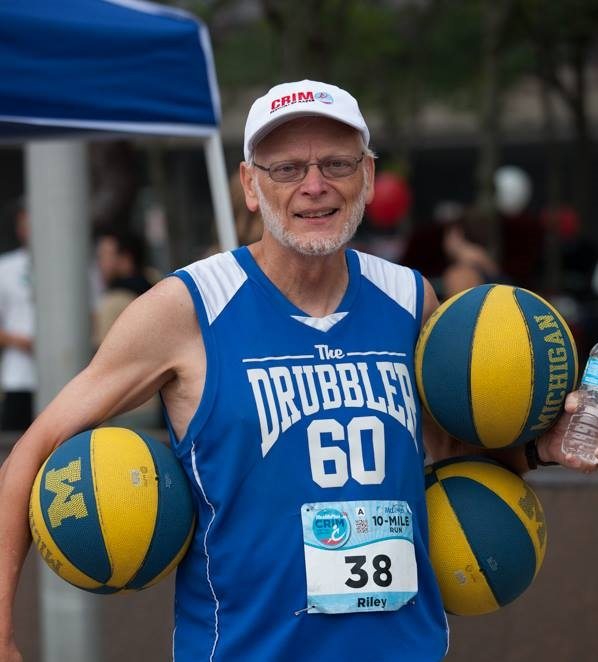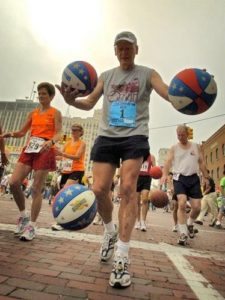 My dad died of a heart attack at age 60. My brother died of a heart attack at age 40. Hearts are the family curse, so the condition of mine is never far from my mind.
My dad died of a heart attack at age 60. My brother died of a heart attack at age 40. Hearts are the family curse, so the condition of mine is never far from my mind.
 I’ve always wondered, “If I ever have to have surgery, how would I handle it?”
I’ve always wondered, “If I ever have to have surgery, how would I handle it?”
I honestly don’t know the answer but I hope I handle it like Riley McLincha of Clio.
If the name sounds familiar it’s because he’s The Drubbler, meaning the guy who dribbles three basketballs at once — drubbling is his name for it — while running the 10-mile Crim road race each August, to the astonishment of his fellow runners and the delight of spectators.
Riley has been a runner — and therefore slim and fit — his whole life. But in April, an old problem finally caught up with him.
“My problem is a congenital defect,” he told me. “Like 2 percent of the population, I was born with a bicuspid aortic valve instead of a tricuspid. By about age 65 that 2 percent needs a valve replacement.”
Riley is 65 but he knew he had a problem four years ago.
“At the start of a run I had some sort of discomfort in my chest. It got progressively worse every year. I had many tests and it wasn’t until 18 months ago I was told I had aortic stenosis and a thoracic aortic aneurysm. The aneurysm was caused by the increased pressure of the blood through a smaller valve opening.”
Fifty years ago, such a diagnosis would have amounted to a death sentence. But these days, owing to the miracles of modern medicine, doctors told him they could fix him up with a pig valve and some flexible Dacron tubing.
He had the surgery in April. Five days later he was out and issuing pig jokes on his Facebook page.
“Since I’m now one-part pig, I decided to make a new (slop) bucket list,” he wrote. It included:
- Renew my ham radio license.
- Become a member of Kevin Bacon Fan Club.
- Rewatch the movie ‘Babe.’ (It’s about a pig in case you hadn’t guessed.)
- Make the Mythbusters prove you can make silk purse from a pig’s ear.
 He later wrote, “My cardiologist said, ‘you are my model patient.’ I’ll say it again (oink) for those who did not get the word, my problem was congenital, my heart has been thoroughly examined and is clean as a whistle because of staying fit. If you are able to get fit, get your Nikes on and just do it. (oink)”
He later wrote, “My cardiologist said, ‘you are my model patient.’ I’ll say it again (oink) for those who did not get the word, my problem was congenital, my heart has been thoroughly examined and is clean as a whistle because of staying fit. If you are able to get fit, get your Nikes on and just do it. (oink)”
At one point, I asked him how he stayed so upbeat and positive throughout such an ordeal.
“Well, mostly, I just wanted to have the surgery so I could return to the lifestyle I’ve always known.”
And joking about it just seemed to help. Or as he wrote the day before the surgery, “I’ve been eagerly waiting to have this surgery now for 17 months. It’s Hammertime! Get this over with so I can go have a Michigan beer.”
Cheers to that, Riley.
By the way, The Drubbler, he says, will be back at the Crim this year, as always.
“If you’re a man with big (basket)balls, it’s what you do.”




Gotta love Riley! I didn’t know about his heart surgery, but I’m happy to hear he is doing just fine. He is “funnier than a crutch” as my mom used to say, although why a crutch is funny is still a mystery to me. Riley’s drubbling never ceases to amaze me. That he can run while doing so is nothing short of a miracle in my book. Thanks for keeping us posted, Andy!
I don’t think it’s a coincidence that you wrote this article. I say that because my husband, who is 55-years-old, is part of that 2% of the population that has a bicuspid aortic valve with severe stenosis. He’ll be having surgery on Tuesday at U of M in Ann Arbor. He found out about his condition in January. Since knowing he’s needed surgery, he has been fearful of the “what-ifs” and the actual surgery itself. Instead of a pig valve, though, he will be getting a cow valve. He does have a very good sense of humor so he has made some cow jokes!
I will be forwarding this article to him so he can read it. I hope it will help alleviate some of his fears.
Thank you, Andy.
Okay, okay. The Drubbler is a great guy, and so are you, Andrew. The thing is, many of the people we meet every day are cancer survivors and aortic heart valve recipients (including my mom), and people who have come through all sorts of problems.
But, they mostly do not seek recognition. They (we) are just regular people, not looking for recognition. Not feeling as if we deserve recognition. Maybe, sometimes, a little peaved when guys such as you and The Drubbler trumpet their health problems and hope for some sort of extra credit.
Everybody has at least one problem, eventually. Not cool to try to cash in. Please stay humble.
Replying to my own post: It is extremely interesting that this guy can dribble three basketballs over the course of a ten-mile race. His health problem is a footnote, at best. Next article, maybe concentrate on the dribbling, rather than the health.
I think you have your cynic goggles on, Tom. Riley didn’t seek out attention – nor am I. (For the record, I don’t have health problems at the moment. I have lifelong worries owing to a family condition.) The thing is, people see themselves in stories. That’s why I do them. In writing about a guy like Riley many others who are going through the same kinds of challenges can find a different perspective. That’s all.
In September 1986 I was in the Army Reserve, 70th Div. on a 5 mile run at Ft. Benning, Ga. about 3 miles into to the run I had to drop out of the run. I had no energy left. I was breathing hard. Could not focus very well.
But I do not have any overt signs of pain in my chest and in my left arm.
The Colonel in charge had me relieved of duty for “being out of shape”.
I came back to Michigan and went and seen my Primary care doctor for my company physical. He did a ekg on me. He compared to my previous ekgs and sent right to the cardiologist.
The cardiologist said that according to the difference in the ekgs that I had a heart attack between the exams.
I learned that a person can have a “heart attack/event” and not realize it.
When you go and have an ekg done make sure whoever is reading the ekg compares it to previous ekgs.
An ekg can look “good” just looking at the one just taken but, unless you look at the previous ones the doctor/cardiologist cannot see if a change has occured since the last one.
The Air Force in the 1970s’ could not figure out why they were losing so many pilots and planes from crashes. Every time they had lost a pilot and aircraft they would look at all sorts of data and could not find a cause. Of course when a fighter pilot flies into the ground at 440 mph there is not usually much left of the pilot.
Then this one flight surgeon was studying a pilots medical file and he lined up the ekg charts and he noticed a difference in the lines.
He checked some other crashed pilots ekgs and they all showed a difference in the ekgs from year to year.
Now they check a pilots ekg from year to year, if there is a change, then they take whatever action they need to take.
As a side note 2 weeks before I dropped out of the 5 mile run a Battalion Commander dropped dead on a different 5 mile run. In the years since there have been 5 or more battalion commanders also drop dead.
Just because a person looks healthy and fit does not mean that they actually are.